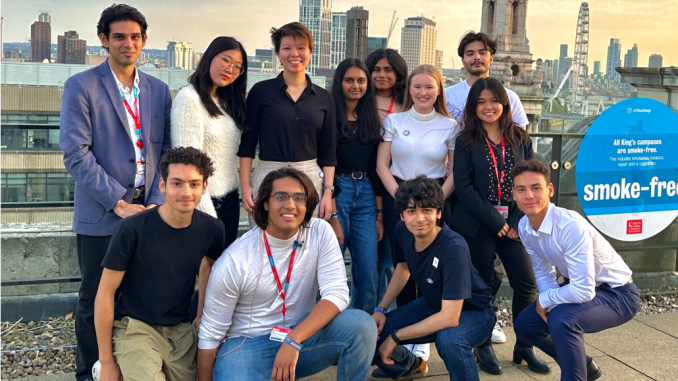
By Shayna Gail Velasquez, 2nd Year MSci Computer Science
As you embark on your academic journey at King’s College London, the key to newfound knowledge is not confined to lecture halls. The heartbeat of university life lies in the
vibrant array of student societies that await your discovery. Join me as we delve into the richness of King’s student society culture, with insights drawn from my own experiences.
 One of the biggest events at the beginning of the year is the Annual Welcome Fair at Old Billingsgate, an event where over 300 societies converge to showcase the different communities within King’s. This unmissable event serves as the perfect launchpad for your university journey, offering interactions with society members first-hand, casual experiences, captivating demos, enlightening videos, and even some free merch!
One of the biggest events at the beginning of the year is the Annual Welcome Fair at Old Billingsgate, an event where over 300 societies converge to showcase the different communities within King’s. This unmissable event serves as the perfect launchpad for your university journey, offering interactions with society members first-hand, casual experiences, captivating demos, enlightening videos, and even some free merch!
Tip: Although the Welcome Fair has quite an early start time, I suggest arriving an hour early to beat the crowds – it can get pretty hectic with that many people.
 Given KCL’s dispersed campuses throughout London, students can often find themselves surrounded only by peers from the same course or department. Societies serve as bridges to connect with other years and those pursuing other disciplines. Beyond academic boundaries, these connections prove invaluable for expanding your network, fostering collaborations, and broadening your horizons. Participating in intercollegiate events might even open the door to forming friendships with students from other universities!
Given KCL’s dispersed campuses throughout London, students can often find themselves surrounded only by peers from the same course or department. Societies serve as bridges to connect with other years and those pursuing other disciplines. Beyond academic boundaries, these connections prove invaluable for expanding your network, fostering collaborations, and broadening your horizons. Participating in intercollegiate events might even open the door to forming friendships with students from other universities!
Joining a society is not merely a box to be ticked; it’s an opportunity to nurture existing passions or unearth new ones. Whether it comes to aligning with your academic focus or venturing into uncharted territories, the key is to follow your interests. Societies offer the ideal platform to immerse yourself in activities that resonate with your passions, contributing not only to personal fulfilment but also enhancing your holistic development.
Your involvement in societies exceeds the university gates, presenting a unique chance to connect with industries aligned with your hobbies and aspirations. The exposure gained through societies can be instrumental in opening doors to internships, collaborations, and career opportunities. By actively participating, you lay the groundwork for a seamless transition from academic pursuits to real-world, practical applications.
For those navigating courses unrelated to their passions, societies are a great outlet.
 One positive aspect of joining a society outside of my course is, drawing from my own experience as the Head of Media for King’s Business Club, that I was able to keep my love for content creation and filmmaking alive whilst also having discovered the power of intertwining technology with the world of film, marketing, and design. I found a medium to build lasting friendships, discover a love for marketing and graphic design and put it into serious practice, which I had not done before university. I was able to collaborate with my teammates to make projects, promote events and learn strategies along the way; exploring and applying my interests, and creating a synergy between my academic pursuits and personal passions.
One positive aspect of joining a society outside of my course is, drawing from my own experience as the Head of Media for King’s Business Club, that I was able to keep my love for content creation and filmmaking alive whilst also having discovered the power of intertwining technology with the world of film, marketing, and design. I found a medium to build lasting friendships, discover a love for marketing and graphic design and put it into serious practice, which I had not done before university. I was able to collaborate with my teammates to make projects, promote events and learn strategies along the way; exploring and applying my interests, and creating a synergy between my academic pursuits and personal passions.
Serving as the Co-Vice President of the Women in Computer Science Society allowed me to delve into leadership dynamics within a student group and discover a profound sense of community among the women in my course. Through our shared experiences, we forged bonds that I’m confident will endure time. Having this network is more than just companionship; it’s about having a reliable group to study with and seek advice from individuals who have navigated similar challenges before me. This camaraderie underscores one of the significant advantages of joining a society closely aligned with your academic pursuits.
Whilst the initial advice of many may be to join as many societies as possible, a word of caution is in order. To maintain a healthy balance, consider filtering your choices early in the school year. My personal advice? Active involvement in the committees of a maximum of two societies can provide a fulfilling experience without compromising the time dedicated to your academic endeavours. Quality over quantity ensures a more rewarding and manageable journey throughout your time at King’s. However, if you feel up to the challenge, exploring additional roles within more societies is entirely open to you.
 Don’t forget that you have the option to establish a society at King’s if you’re passionate about sharing your niche interest with others! Connecting with like-minded individuals becomes even more accessible by reaching out to KCLSU (King’s College London Students’ Union). This avenue not only allows you to cultivate a community around your unique passion but also contributes to the diverse range of societies at King’s. For example, I recently established IBM Z KCL Chapter Society with two of my friends, a society officially affiliated with IBM that will focus on providing a platform for students interested in mainframe computing and related technologies.
Don’t forget that you have the option to establish a society at King’s if you’re passionate about sharing your niche interest with others! Connecting with like-minded individuals becomes even more accessible by reaching out to KCLSU (King’s College London Students’ Union). This avenue not only allows you to cultivate a community around your unique passion but also contributes to the diverse range of societies at King’s. For example, I recently established IBM Z KCL Chapter Society with two of my friends, a society officially affiliated with IBM that will focus on providing a platform for students interested in mainframe computing and related technologies.
As you step into the dynamic world of King’s student societies, remember that this journey is as unique as you are. Embrace the diversity, seek out the societies that resonate with your passions, and let your university experience flourish beyond the lecture halls. It is not just an extracurricular activity – it’s a transformative pathway that can shape your academic, professional, and personal growth. Welcome to a vibrant community where the pursuit of knowledge extends far beyond your course.
Your time at King’s is an opportunity to not only excel academically but to also cultivate a rich and diverse university experience. The vast array of student societies provides a canvas for you to paint your own fulfilling journey.
So, step into the world of possibilities, explore your passions, and let the array of societies at King’s weave an unforgettable chapter in your academic journey. Go and see what’s out there!

Leave a Reply